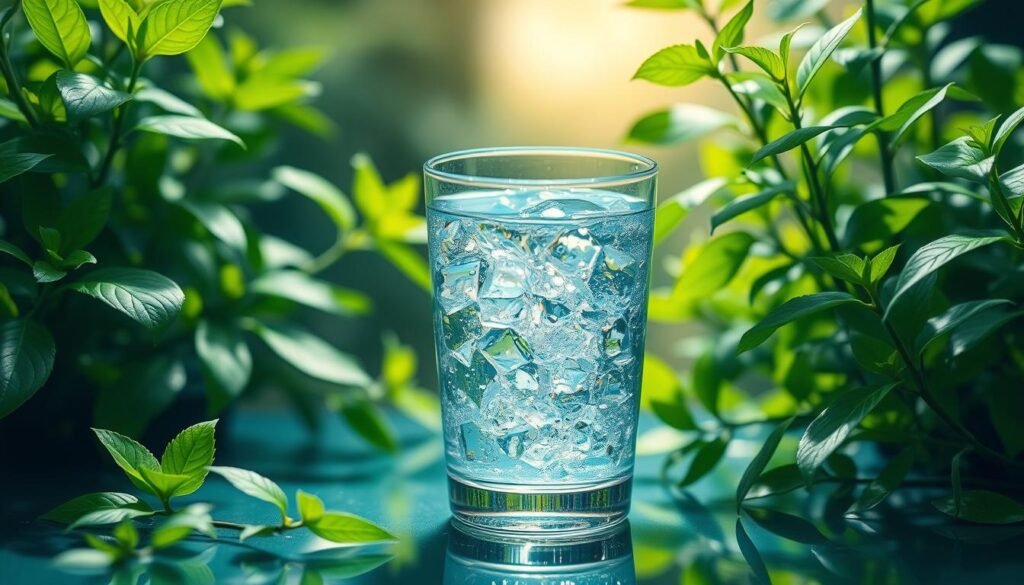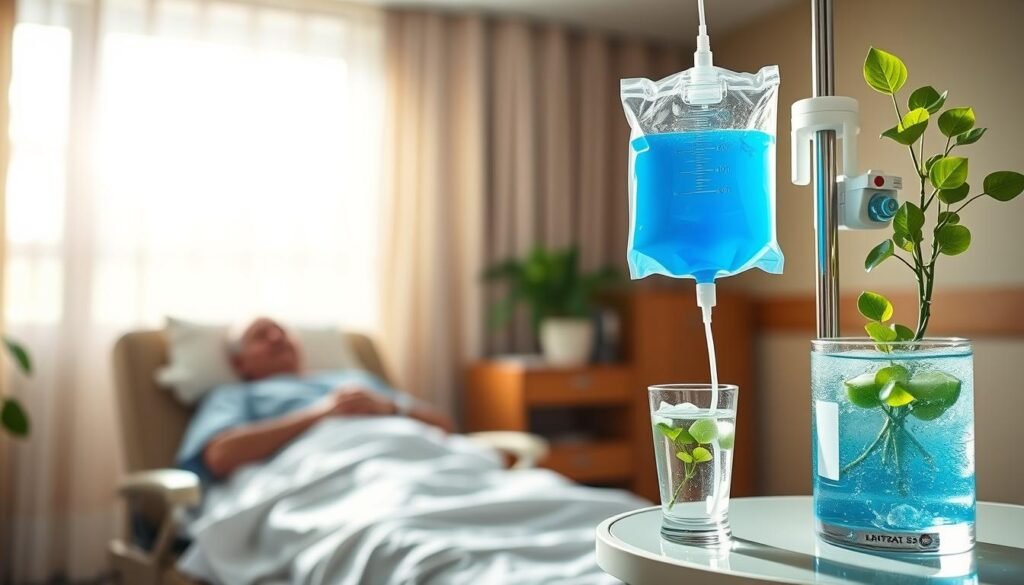About 60% of cancer patients get dehydrated during their treatment. Hydration is crucial for better lung cancer treatment results. It makes treatments like chemotherapy, radiation, and immunotherapy more effective. Being hydrated helps the body handle therapy side effects better. This can lead to improved health and potentially better responses to treatment.
Keeping hydrated is key for cellular function and impacts lung cancer treatment. Cancer care teams watch hydration levels closely. They want to prevent the harsh effects of dehydration. For those undergoing lung cancer treatment, knowing how to stay hydrated is important. For tips on hydration, check this resource on hydration and wellness.
Key Takeaways
- The importance of hydration cannot be overstated in lung cancer treatment.
- Proper hydration aids in flushing out toxins from cancer therapies.
- Staying hydrated helps mitigate symptoms like nausea and fatigue.
- Monitoring hydration levels is a critical aspect of cancer care.
- Hydration strategies can enhance cellular function, benefiting treatment outcomes.
The Importance of Hydration in Cancer Care
Keeping hydrated is key in cancer care. It greatly impacts health and how well treatment works. Hydration helps with blood flow, absorbs nutrients, and gets rid of toxins. It’s very important for lung cancer patients to stay hydrated for their health and treatments.
Understanding Hydration and Its Impact
Our bodies need water to work well. Water helps cells transport nutrients and remove waste. In cancer care, staying hydrated can make treatments work better. It does this by improving blood flow and helping spread medicine throughout the body. Drinking enough water can also boost immunity and speed up recovery.
Why Hydration Matters for Lung Cancer Patients
Hydration is especially important for lung cancer patients. Treatments like chemotherapy and radiation cause side effects. These can include nausea, tiredness, and dry mouth. Drinking enough water helps ease these symptoms. It also helps avoid other issues like infections. This keeps the immune system strong during treatment.
| Hydration Benefits | Impact on Cancer Care |
|---|---|
| Enhanced Nutrient Transport | Improves absorption of medications and vitamins |
| Toxin Elimination | Reduces toxicity levels in the body |
| Improved Physical Well-being | Boosts energy levels and alleviates fatigue |
| Support for Immune Function | Strengthens body’s defenses against infections |
Understanding how important hydration is can help patients and caregivers. It encourages them to make drinking fluids a key part of cancer care. Awareness about hydration can lead to better treatment experiences and results for lung cancer patients.
Hydrated Enhances Lung Cancer Treatment
Staying hydrated is key for good health, especially when treating lung cancer. Water helps cells work right and plays a part in how well treatment works. Being well-hydrated boosts energy and reduces tiredness, making tough times a bit easier.
The Role of Water in Cellular Function
Water keeps cells healthy and supports important activities. It moves nutrients, gets rid of waste, and controls body temperature. Good hydration makes cell function better, improving how treatments like chemotherapy and radiation work.
When cells are hydrated, they can better handle treatment. Studies show being well-hydrated makes medicine more effective by helping it get where it’s needed.
Improving Physical Well-being Through Hydration
Drinking enough water does more than help cells; it also boosts physical health. Cancer treatment can make you tired. Drinking water helps fight that tiredness. Patients drinking enough water feel more energetic and lively. This energy helps them deal with side effects and improves life quality during recovery.

Hydration Therapy: A Key Component in Oncology
Hydration therapy is crucial in oncology, especially for lung cancer treatments. It helps manage side effects and maintains health. It includes personalized methods for each patient.
What is Hydration Therapy?
Hydration therapy keeps patients’ fluid levels right. It’s given either by mouth or through the veins. The patient’s needs and condition decide which method. Doctors check hydration by observing symptoms and health. It’s essential when treatments cause vomiting or diarrhea. Keeping electrolytes balanced helps improve treatment effects in cancer care.
Administering Hydration Therapy During Treatment
The needs of each patient guide hydration therapy. It starts with deciding between oral or IV fluids. The plan may include:
- Checking how much fluid is taken in and out.
- Choosing drinks like water, herbal teas, or sports drinks.
- Encouraging at least 6-8 cups of fluids a day.
Regular checks make sure hydration therapy is working. It’s a big help for lung cancer patients during their treatment. For tips on staying hydrated, check out hydration-friendly drink choices.
| Hydration Method | When Used | Benefits |
|---|---|---|
| Oral Hydration | For mild dehydration | Easy to administer, encourages fluid intake |
| Intravenous Hydration | For moderate to severe dehydration | Rapid rehydration, effective electrolyte replenishment |
Effects of Dehydration on Lung Cancer Treatment
Understanding dehydration’s impact is key for those facing lung cancer treatment. Dehydration can trigger many negative effects. It greatly affects patient health and how well treatment works.
Short-Term and Long-Term Consequences
Dehydration brings serious dehydration consequences for lung cancer patients. In the short term, patients might experience:
- Impaired organ function, hurting overall health.
- Lower success of treatment options, complicating recovery.
- Higher risk of being hospitalized due to these issues.
Over time, patients may face ongoing fatigue, struggle with recovery, and hit more obstacles that affect treatment.
Recognizing Signs of Dehydration
Knowing the dehydration signs is critical for patients and those caring for them. Look out for:
- Dizziness or lightheadedness.
- Dry mouth and intense thirst.
- Dark urine or less urine than usual.
Watching for these signs can greatly help lung cancer treatment. Quick action is crucial. It helps keep hydration levels up and supports health during treatment.
Hydration Strategies for Patients Undergoing Treatment
Staying hydrated is crucial during cancer treatment, especially for those with lung cancer. Good hydration strategies boost well-being and can help with treatment success.
Tips for Staying Hydrated
Keeping hydrated might be tough during treatment. Here are helpful tips:
- Set daily water goals for better focus.
- Use smartphone reminders or apps to monitor hydration.
- Drink water regularly, like before meals or after exercise.
- Try flavored water or herbal teas for variety.
- Keep a water bottle handy for easy access.
Hydration-Friendly Foods and Beverages
Some foods also help keep you hydrated. Adding these to your meals can up your fluid intake. Check out these options:
| Food | Water Content (%) |
|---|---|
| Watermelon | 92 |
| Cucumbers | 95 |
| Strawberries | 91 |
| Celery | 95 |
| Oranges | 86 |
Fruits and veggies are top for hydration. They give you fluids and important nutrients.
To boost hydration efforts, exploring effective hydration strategies can help. These habits can greatly improve comfort and health while going through cancer treatment.
Hydration in Different Types of Cancer Treatment
Staying hydrated is key for cancer treatment patients. It helps make treatment more successful and comfortable. Knowing how water helps during chemotherapy, radiation, and immunotherapy is useful. It lets patients and doctors work together better to improve results.
Benefits During Chemotherapy
Water intake is crucial when undergoing chemotherapy. It lessens side effects like nausea, kidney harm, and tiredness. This makes it easier for patients to handle their medications. Proper hydration means fewer negative effects. So, patients have a better experience with their treatment.
Hydration During Radiation Therapy
For those getting radiation, drinking enough water is essential. It keeps the healthy tissue around the treated area safer. This reduces skin issues and soreness. Drinking more water helps with healing after treatment. It shows why following hydration tips is important in cancer care.
Supporting Immunotherapy with Adequate Hydration
Immunotherapy also benefits from staying hydrated. Water helps the immune system work its best. It makes sure the body can fight off threats. Staying hydrated helps immunotherapy work better, encouraging healthier cell activity. So, patients paying attention to their water intake might see better results from these new treatments. This can increase their recovery chances.

Clinical Trials and Hydration Research
Experts are looking closely at how staying well-hydrated helps people with lung cancer respond to treatment. Hydration clinical trials are underway to understand this better. These studies test how water intake affects chemotherapy effectiveness and patient health.
By studying these links, researchers hope to learn more. This could change how doctors treat cancer, making patients feel better overall. Check out these current studies for more information.
Current Studies on Hydration in Cancer Treatment
Hydration is becoming known as crucial for lung cancer patients. It’s thought to help manage symptoms and treatment side effects better. This could make treatments like chemo more effective.
Future Directions in Hydration and Oncology
Looking ahead, future hydration studies are exciting for cancer care. Researchers are finding new ways to use hydration to improve how treatments work.
This could make staying hydrated a key part of fighting cancer. Scientists believe focusing on hydration will bring better treatment options. Their work is essential for creating a better care standard.
Patient Testimonials: The Hydration Experience
Hearing from those who have fought lung cancer is truly eye-opening. They share how staying hydrated helped them recover. Their stories, along with expert advice, show how important it is to drink enough fluids during cancer care.
Real Stories of Improved Outcomes
Many have told how better hydration changed their treatment experience. One person said they felt energized after they began to drink more water.
“I felt like a new person once I started paying attention to my water intake. It made a real difference in how I handled my treatment.”
This shows that drinking water can make treatment easier and improve your health.
Expert Opinions on Hydration’s Benefits
Doctors and nutritionists stress drinking water is key. Dr. Sarah Thompson says,
“Hydration is a cornerstone of cancer care. It aids in maintaining energy levels, reducing side effects, and supporting overall health.”
Nutritionists agree that drinking water helps remove toxins and supports body functions. This leads to better results from treatment. Experts and patients agree: staying hydrated is vital during cancer treatment.

| Patient Name | Hydration Strategy Used | Reported Benefits |
|---|---|---|
| Patient A | Daily hydration schedule | Increased energy and reduced fatigue |
| Patient B | Incorporating hydrating foods | Fewer side effects from treatment |
| Patient C | Fluid intake tracking | Improved mood and focus |
Through these personal and expert views, it’s clear hydration is key in cancer treatment. Both patient stories and expert advice make a strong case for the importance of water in recovery.
Conclusion
For lung cancer patients, keeping hydrated during treatment is key. It helps make treatment work better and ease side effects. Staying hydrated is crucial, whether it’s chemo or radiation.
Hydration is a big part of cancer care, as we’ve seen in this article. It’s good for your cells and your health. So, drinking enough water is more than just helpful; it’s necessary for fighting cancer.
Hydration is a powerful tool for cancer patients and their caregivers. Drinking water is a simple act, but it’s very important. It helps patients cope better and stay strong during treatment.